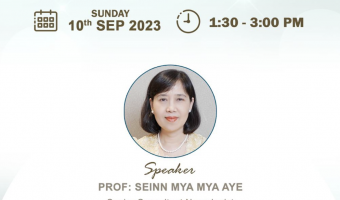Comprehensive Dementia Care
About This Course
Speaker
- Prof. Sein Mya Mya Aye Senior Consultant Neurologist
- Prof. Tin Oo Senior Consultant Psychiatrist
- Dr. Aung Pyi Soe (Family Physician)
- Dr Win Myint Tun (Consultant Radiologist)
Module 1: Introduction to Dementia
- Understanding Dementia: Definition, prevalence, and impact on individuals and society.
- Types of Dementia: Alzheimer’s disease, vascular dementia, frontotemporal dementia (FTD), Lewy body dementia (LBD), and others.
- Pathophysiology: Brain changes and mechanisms underlying different types of dementia.
Module 2: Diagnosis and Assessment
- Diagnostic Criteria: Clinical evaluation, neuroimaging (CT, MRI, PET), and biomarkers.
- Assessment Tools: Cognitive screening tests, functional assessments, and behavioral evaluations.
- Role of Imaging: Neuroimaging techniques in differential diagnosis and disease staging.
Module 3: Behavioral and Psychological Symptoms of Dementia (BPSD)
- Common BPSD: Agitation, aggression, hallucinations, depression, and sleep disturbances.
- Management Strategies: Pharmacological and non-pharmacological interventions.
- Caregiver Education: Techniques for managing challenging behaviors and enhancing communication.
Module 4: Management and Treatment
- Pharmacological Therapies: Medications for cognitive symptoms, behavioral management, and symptom relief.
- Non-Pharmacological Approaches: Cognitive stimulation, reminiscence therapy, art and music therapy, and sensory stimulation.
- Holistic Care: Integrative approaches to improve quality of life for patients and caregivers.
Module 5: Caregiver Support and Education
- Role of Caregivers: Challenges and responsibilities in dementia care.
- Educational Programs: Resources and strategies for caregiver education and support.
- Self-Care for Caregivers: Stress management, respite care, and community resources.
Module 6: Special Considerations and Advanced Topics
- Young-Onset Dementia: Unique challenges and diagnostic considerations.
- Dementia in Resource-Limited Settings: Shared care models, optimizing resources, and community-based interventions.
- Future Directions: Emerging research, innovative therapies, and potential breakthroughs in dementia care.
Module 7: Case Studies and Practical Application
- Case-Based Learning: Real-life scenarios illustrating diagnostic challenges, treatment decisions, and caregiver interventions.
- Interactive Discussions: Group exercises and role-playing to practice communication skills and problem-solving.
Module 8: Ethical and Legal Issues
- Ethical Considerations: End-of-life care, decision-making capacity, and advanced directives.
- Legal Aspects: Guardianship, informed consent, and navigating legal frameworks in dementia care.
Module 9: Collaborative Care and Interdisciplinary Approach
- Team-Based Care: Role of neurologists, geriatricians, psychiatrists, nurses, social workers, and other healthcare professionals.
- Patient-Centered Care: Individualized care planning, family involvement, and community support networks.
Module 10: Continuous Learning and Professional Development
- Continuing Education: CME opportunities, conferences, and updates in dementia research and practice.
- Self-Assessment: Reflection on personal learning goals and ongoing professional development in dementia care.
Learning Objectives
Vascular Dementia
Behavioral & Psychological Symptoms In Different Types of Dementia
CME Series on Dementia : Alzheimer's Dementia
CME Series on Dementia : An Overview (Neurologist)
FTD, LBD and Other Dementia
Management of BPSD
Management of Dementia
Care of patients with dementia :Tips for Caregivers Education and Support
Shared Care in Management of Dementia in Resource Limited Settings
Role of Imagine in Diagnosis of Dementia
Curriculum
10 Lessons18h 51m



